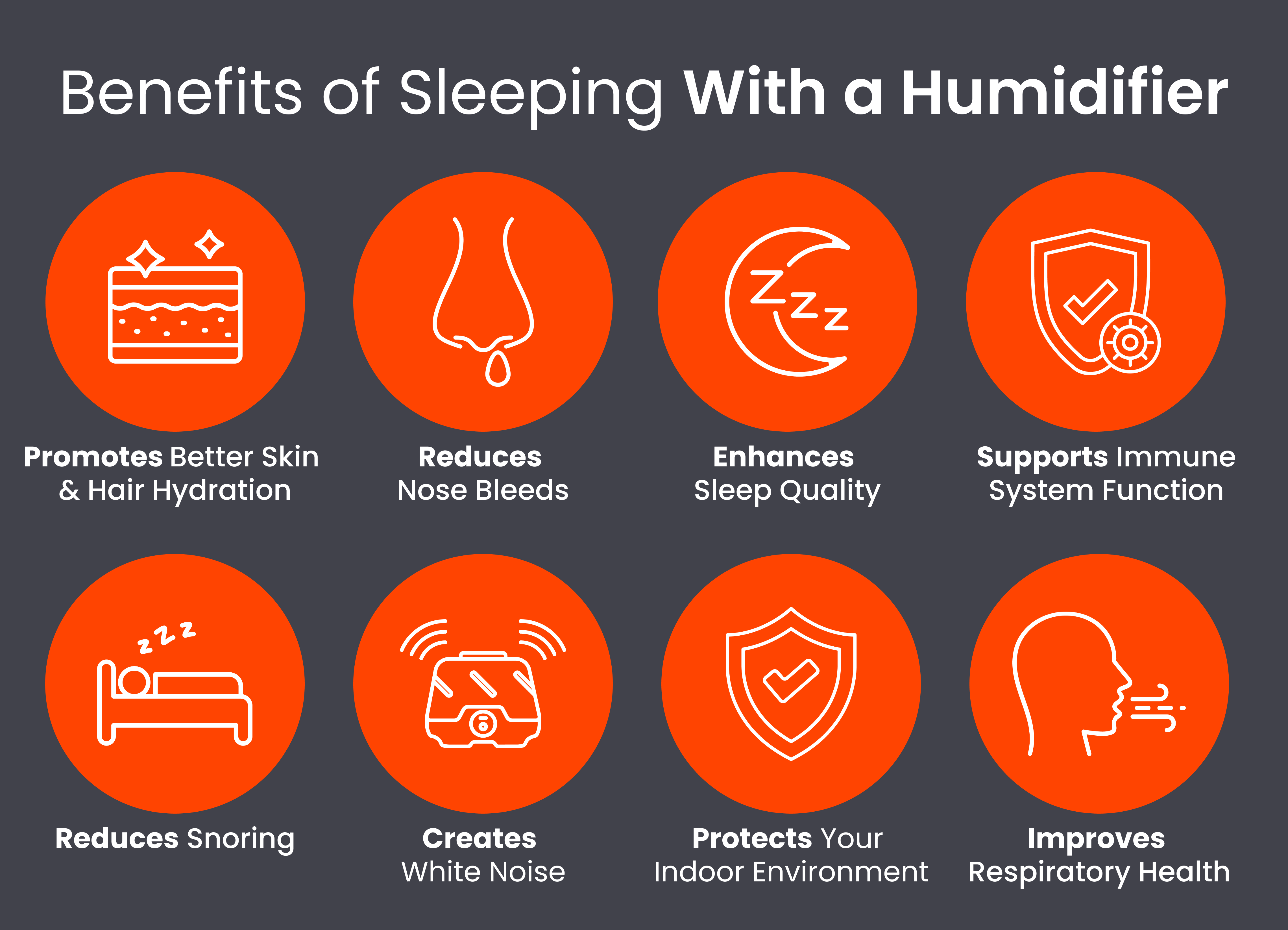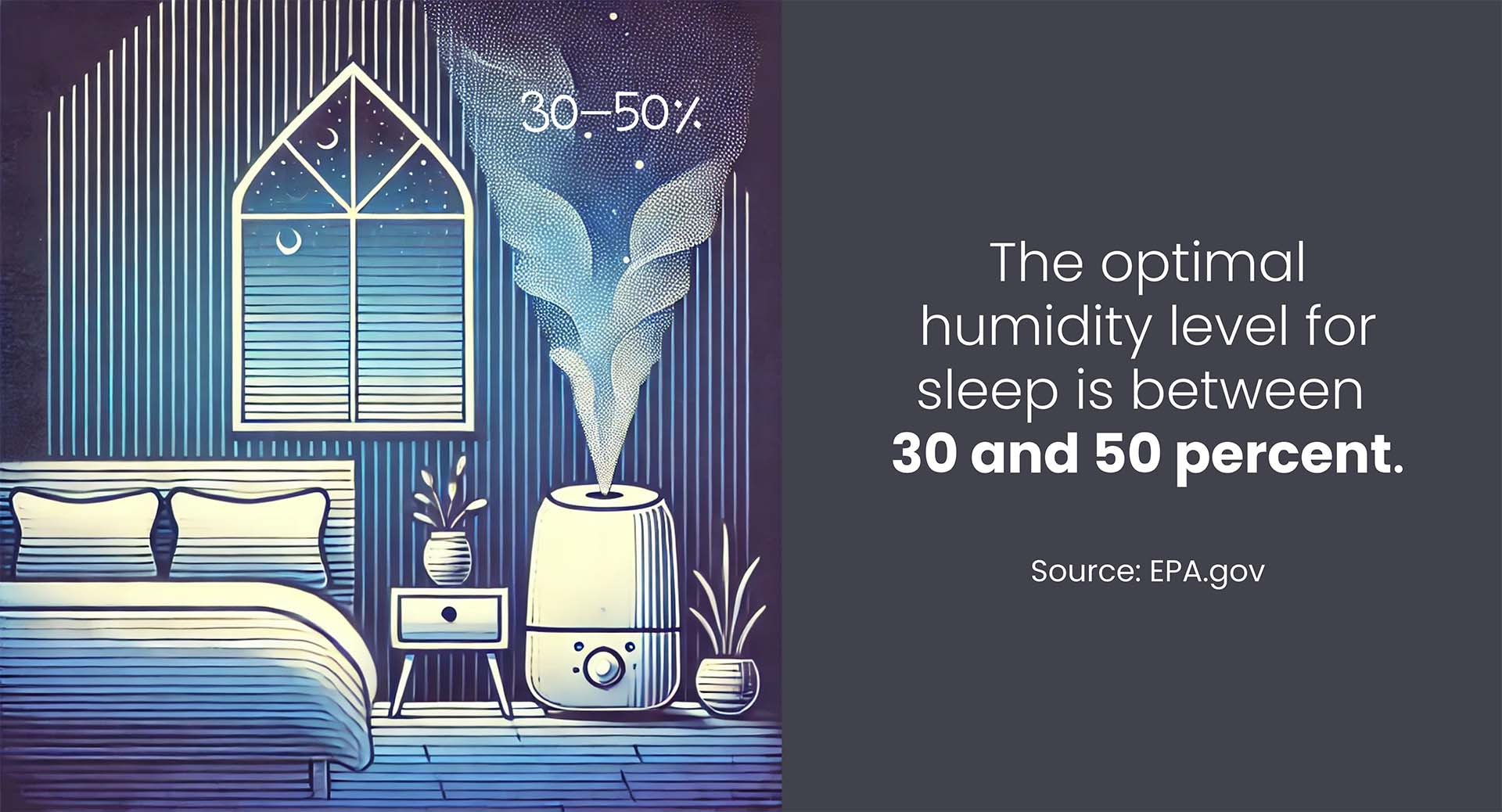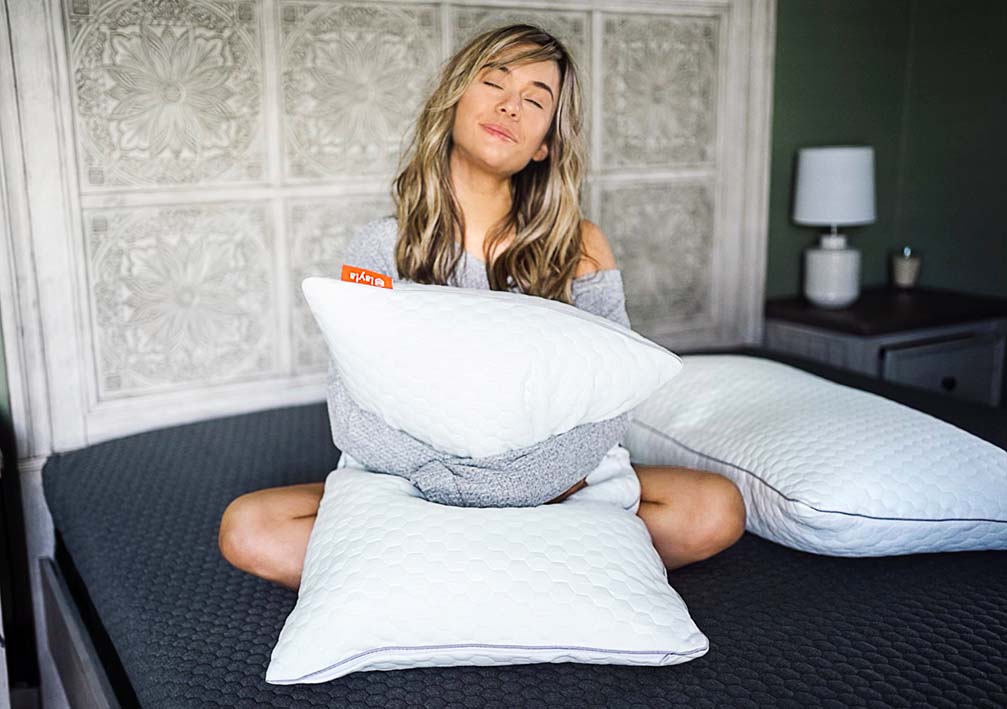A humidifier adds humidity or moisture to the air, helping maintain optimal humidity levels in your space. It converts water into fine mist or vapor that disperses throughout your room. While this might seem simple, the impact on your sleep quality and overall health can be significant. Let’s explore how sleeping with a humidifier can transform your nights and improve your well-being.
- Key Takeaways
- Improves Respiratory Health
- Promotes Better Skin and Hair Hydration
- Reduces Nose Bleeds
- Enhances Sleep Quality
- Supports Immune System Function
- Reduces Snoring
- Creates White Noise
- Protects Your Indoor Environment
- Sleeping With a Humidifier FAQs
- Achieving Deep Sleep: Leveraging the Benefits of a Humidifier While Sleeping
Key Takeaways
- Proper humidity levels are essential for optimal respiratory health and can significantly improve sleep quality.
- Regular use of a humidifier can help prevent dry skin, reduce allergy symptoms, and potentially lower the risk of transmitting airborne illnesses.
- The gentle white noise produced by humidifiers can create a peaceful sleeping environment.
- Proper maintenance, including daily water changes and weekly cleaning, is crucial for safe humidifier operation.
- The strategic placement of a humidifier ensures optimal moisture distribution throughout your bedroom to promote sleep.

1. Improves Respiratory Health
One primary benefit of sleeping with a humidifier is its positive impact on respiratory health. Dry air may irritate your airways, leading to coughing, congestion, and discomfort.[1] For those seeking nighttime allergy relief, a humidifier can be particularly beneficial by soothing irritated nasal passages and reducing inflammation.
The added moisture helps thin mucus secretions, making breathing easier and potentially reducing asthma symptoms and allergies. This is especially important for those who experience nasal congestion at night, as proper humidity levels can help maintain clear airways throughout sleep.
2. Promotes Better Skin and Hair Hydration
The moisture a humidifier provides doesn’t just benefit your internal systems — it can work wonders for your skin and hair, too. When sleeping in a room with optimal humidity levels, your skin retains moisture more effectively, helping prevent the dry, itchy feeling many often experience upon waking.
For those with sensitive skin conditions like eczema, the benefits of a humidifier in a bedroom space can be particularly noticeable.[2] The consistent moisture level helps prevent skin from becoming overly dry and irritated during the night, potentially reducing flare-ups and discomfort.
3. Reduces Nose Bleeds
Dry air can be particularly harsh on nasal passages, sometimes leading to uncomfortable nosebleeds.[3] A humidifier helps maintain the delicate moisture balance in your nasal passages, reducing the likelihood of bleeding and irritation.
By maintaining proper humidity levels, you’re creating an environment where your nasal membranes can function optimally. This helps prevent nosebleeds and the discomfort of dry nasal passages, which can disrupt your deep sleep.
4. Enhances Sleep Quality
The connection between humidity levels and sleep quality isn’t something most people typically think about, but it’s important nonetheless. Proper humidity can help you breathe more easily,[4] which is essential for promoting relaxation to help you fall asleep and for maintaining uninterrupted sleep. Many people also find that meditation for sleep becomes more effective in a properly humidified room, as the comfortable breathing environment helps relax the body.
To fully optimize your sleep quality, pair your humidifier with other sleep essentials. A memory foam mattress combined with optimal humidity levels can create the perfect sleep environment. The humidity helps prevent dry and irritated airways, which could otherwise cause you to wake up throughout the night, while a supportive mattress matches the contours of your body to ensure proper spinal alignment throughout the night.
5. Supports Immune System Function
Proper humidity levels help boost the effectiveness of your immune system. Research shows that humidifiers can help reduce the spread of flu viruses and other airborne illnesses.[5] This works because proper humidity helps moisten your mucous membranes, allowing them to better trap and eliminate potential pathogens.
When considering natural sleep aids, a humidifier can be an excellent addition to your nighttime wellness routine. The moisture it provides helps your body’s natural defense mechanisms work more effectively, potentially reducing your susceptibility to various respiratory infections.
6. Reduces Snoring
If you struggle with snoring, a humidifier might provide some relief. Dry air can irritate the nasal passages and throat, potentially increasing snoring.[6] Humidifying the air can help keep these passages lubricated, potentially reducing the intensity and frequency of snoring.
The balanced humidity helps maintain comfortable breathing throughout the night, potentially reducing both snoring and sleep disturbances.
7. Creates White Noise
Beyond adding moisture to the air, a humidifier can also serve as an excellent source of white noise for sleep. The gentle, consistent sound created by most humidifiers can help mask disruptive noises like sirens, car horns, and noisy roommates, creating a peaceful sleeping environment.
This steady background noise can help signal to your brain that it’s time to rest, making falling and staying asleep easier. Many people find this additional benefit particularly helpful in urban environments or when dealing with irregular sleep schedules.
8. Protects Your Indoor Environment
While the primary benefits of a humidifier while sleeping relate to health and comfort, these devices also help protect your living space. Proper humidity levels can prevent wood furniture from cracking, protect musical instruments, and maintain the integrity of paper products and artwork.
This protective effect extends to your bedding and furniture as well. Maintaining optimal humidity can help preserve the quality of your bedroom furnishings, ensuring they remain comfortable and functional for years to come.
Sleeping With a Humidifier FAQs
What is the best humidity level for sleep?
The ideal indoor humidity level is between 30 and 50 percent.[7] Consider using a humidity gauge or hygrometer to monitor these levels in your bedroom. This range provides optimal comfort while preventing mold and mildew growth at higher humidity levels.

Keep in mind that while lower humidity levels can cause issues that lead to poor sleep quality, so can higher humidity in a room. Higher humidity levels can make you feel warmer. If you’re trying to learn how to stop sweating at night, check your thermostat and bedroom humidity level to ensure maximum comfort.
Is it safe to sleep with a humidifier?
Yes, sleeping with a humidifier is generally safe and can provide numerous health benefits, from better breathing to improved skin hydration. However, you’ll need to properly maintain your device to ensure it remains a helpful sleep aid rather than a potential source of problems.
The most important maintenance tasks include:
- Empty and refill the water basin daily to prevent the water from stagnating, which can result in a breeding ground for bacteria.
- Clean the humidifier thoroughly once weekly using a mixture of white vinegar and water or manufacturer-recommended cleaning solutions.
- Regularly inspect and replace filters according to the manufacturer’s guidelines.
- Keep the area around the humidifier dry to prevent moisture accumulation.
It is strongly recommended that distilled water be used instead of tap water, as tap water typically contains minerals that can clog the machine and eventually lead to bacterial growth. A humidifier can also release these minerals into the air as “white dust,” which may irritate respiratory systems. While distilled water might cost a bit more, it’s a worthwhile investment for your health and the longevity of your device.
Additionally, make sure to:
- Position the humidifier on a waterproof surface elevated from the floor
- Monitor humidity levels regularly using a hygrometer
- Clean all parts of the humidifier, including the base, tank, and any removable parts
- Replace the water daily, even if the tank isn’t empty
- Never add essential oils unless your humidifier is specifically designed for them
How close should a humidifier be to your bed?
Most manufacturers recommend placing your humidifier approximately three to four feet away from your bed. This distance allows for optimal moisture distribution while preventing direct exposure to the mist. Always consult your specific model’s manual for precise placement recommendations.
What are the different types of humidifiers?
According to the EPA, there are three main types of humidifiers:[8]
- Central humidifiers: These are built into home HVAC systems and allow you to set your optimal humidity. These are ideal for homeowners who want to maintain consistent humidity throughout their entire house. Initially, they’re the most expensive option but offer the most comprehensive coverage and require the least day-to-day maintenance.
- Console humidifiers: Standalone units that can add moisture to multiple rooms. These are perfect for those who want to humidify several connected spaces or a large area without installing a central system. They’re more powerful than portable units and can effectively handle spaces up to 1,000 square feet or more.
- Portable humidifiers: These smaller units are designed for single-room use. They are the most affordable and flexible option, perfect for renters or those who only need humidity control in specific rooms. They’re easy to move and maintain, ideal for bedrooms or home offices.
Achieving Deep Sleep: Leveraging the Benefits of a Humidifier While Sleeping
Creating the perfect sleep environment involves multiple factors, from choosing the right humidity levels to selecting appropriate bedding and sleep accessories. A humidifier can be crucial in this setup, working alongside other elements to promote restful sleep.
At Layla Sleep, we understand the importance of creating an optimal sleep environment. While a humidifier can help maintain ideal air quality, pairing it with high-quality bedding and the right mattress can further enhance your sleep experience. Explore our selection of sleep products designed to work in harmony with your humidifier for the best possible night’s rest.
References
- “How Dry Winter Air Can Cause Respiratory Problems— From Bronchitis to Nosebleeds.” Cleveland Clinic, 15 July 2024, health.clevelandclinic.org/can-best-combat-effects-dry-winter-air.
- Goad, N., & D.J. Gawkrodger. 2016). Ambient humidity and the skin: the impact of air humidity in healthy and diseased states. Journal of the European Academy of Dermatology and Venereology, 30(8), 1285–1294. https://doi.org/10.1111/jdv.13707
- Nosebleeds (Epistaxis): Causes, Treatment & Prevention. (2023, August 31). Cleveland Clinic.
https://my.clevelandclinic.org/health/diseases/13464-nosebleed-epistaxis - Humidifiers: Why you might need them. (2024). Mayo Clinic. https://www.mayoclinic.org/diseases-conditions/common-cold/in-depth/humidifiers/art-20048021
- Jones, S. (2023, December 26). Can Humidifiers Prevent the Flu? AFC Urgent Care North Carolina. https://afcurgentcarecharlottenc.com/can-humidifiers-prevent-the-flu/
- Shavers, B. (2024, June 7). Are You Facing Snoring Problems? Learn About ENT Help. Otolaryngologists in OKC | OKOA; Skybound Digital LLC. https://www.okoa.org/articles/do-humidifiers-help-in-reducing-snoring
- Care for Your Air: A Guide to Indoor Air Quality | US EPA. (2014, August 28). US EPA. https://www.epa.gov/indoor-air-quality-iaq/care-your-air-guide-indoor-air-quality
- Use and Care of Home Humidifiers | US EPA. (2022, March 30). US EPA. https://www.epa.gov/indoor-air-quality-iaq/use-and-care-home-humidifiers


